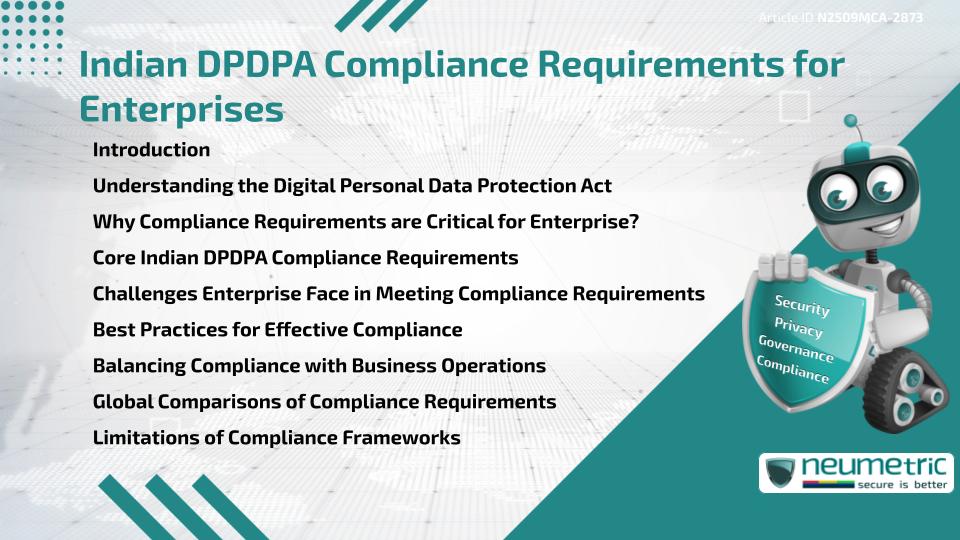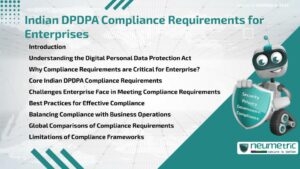Table of Contents
ToggleIntroduction
The Indian DPDPA Compliance Requirements establish a Framework for Enterprise to handle Personal Data responsibly under the Digital Personal Data Protection Act [DPDPA]. These requirements ensure that Businesses protect User Rights, maintain Fairness, Transparency & Accountability & avoid Penalties. This article explains the core Compliance Requirements, common challenges & best practices Enterprise can follow to achieve effective Compliance.
Understanding the Digital Personal Data Protection Act
The DPDPA is India’s first comprehensive law dedicated to Personal Data Protection. It applies to Enterprise of all sizes, covering how they collect, process & store Personal Data. Similar to International Regulations such as GDPR, the Indian DPDPA Compliance Requirements focus on Accountability, Security & respect for User Rights. Compliance is not Optional-Non-Compliance can result in Financial Penalties & Reputational damage.
Why Compliance Requirements are Critical for Enterprise?
Enterprise must understand & implement Compliance Requirements because:
- Non-Compliance can lead to heavy fines.
- Customers expect Data Protection as part of Business Objectives & Customer Expectations.
- Effective Compliance builds long-term Trust & Credibility.
- Regulators demand demonstrable Accountability.
Without adherence to the Indian DPDPA Compliance Requirements, Enterprise expose themselves to Operational & Reputational Risks.
Core Indian DPDPA Compliance Requirements
Enterprise must address several key areas:
- Consent Management: Obtaining informed Consent & allowing easy Withdrawal.
- Data Minimisation: Collecting only what is necessary for Business purposes.
- Security Measures: Implementing safeguards against Data Breaches.
- Vendor Management: Ensuring Third Party Vendors comply with DPDPA Standards.
- Incident Response: Establishing processes for timely Breach reporting.
- User Rights Management: Respecting Rights such as access, correction & withdrawal.
- Audit & Documentation: Maintaining records to demonstrate Compliance.
These elements form the backbone of the Indian DPDPA Compliance Requirements.
Challenges Enterprise Face in Meeting Compliance Requirements
Enterprise often encounter difficulties, such as:
- Complex IT Infrastructure: Legacy Systems may not align with Compliance demands.
- Costs: Implementing safeguards & training Staff can be expensive.
- Resource Constraints: Smaller Organisations may lack skilled Compliance Professionals.
- Vendor Oversight: Monitoring multiple Third Party Vendors can be challenging.
These challenges make Compliance an ongoing effort rather than a one-time project.
Best Practices for Effective Compliance
To manage Compliance effectively, Enterprise should:
- Conduct Gap Assessments to identify weak areas.
- Automate Compliance reporting & monitoring.
- Provide continuous Staff training.
- Develop clear Data Protection Policies.
- Engage External Experts for periodic reviews.
These practices enhance Compliance readiness & reduce Risks.
Balancing Compliance with Business Operations
Compliance must be integrated with day-to-day operations rather than treated as a separate process. Overly rigid controls may disrupt Workflows, while lax oversight increases Risks. The Indian DPDPA Compliance Requirements encourage Enterprise to embed Security, Availability, Processing Integrity, Confidentiality & Privacy into Business practices, ensuring Compliance does not hinder innovation.
Global Comparisons of Compliance Requirements
International Frameworks such as GDPR & HIPAA provide similar Compliance obligations. The Indian DPDPA Compliance Requirements adopt comparable principles but are tailored to India’s unique Business environment, where Enterprise range from Small Startups to Large Corporations.
Limitations of Compliance Frameworks
While comprehensive, Compliance Frameworks have limitations:
- They cannot prevent all Risks.
- Over-reliance on documentation may create a “tick-box” approach.
- Smaller Enterprise may find full Compliance resource-intensive.
Recognising these limitations ensures Enterprise approach Compliance realistically.
Takeaways
- The DPDPA outlines clear Compliance Requirements for Enterprise.
- Core areas include Consent, Security, Vendor Oversight & User Rights.
- Challenges include Costs, IT complexity & Vendor Management.
- Best Practices involve automation, training & external reviews.
- Compliance must be embedded into Operations to balance efficiency & Accountability.
FAQ
What are the Indian DPDPA Compliance Requirements?
They are obligations for Enterprise under the Digital Personal Data Protection Act to ensure responsible handling of Personal Data.
Why are Compliance Requirements important for Enterprise?
They prevent Penalties, build Customer Trust & ensure Accountability in Data Handling.
What are the key elements of the Indian DPDPA Compliance Requirements?
Consent Management, Security, Vendor Oversight, Incident Response & Audit Documentation are key elements.
What challenges do Enterprise face in achieving Compliance?
Common challenges include high Costs, Legacy IT Systems & Vendor Oversight.
How can Enterprise improve Compliance readiness?
By conducting Gap Assessments, automating Monitoring & training Employees.
Does Compliance guarantee zero Data Breaches?
No, but it significantly reduces Risks & ensures Accountability when Breaches occur.
Can Small Enterprise meet the Indian DPDPA Compliance Requirements?
Yes, though they may need simplified processes or external support.
How does the Indian DPDPA compare with GDPR?
Both share Core Principles, but the Indian Law is adapted to the Country’s Regulatory & Business context.
Need help for Security, Privacy, Governance & VAPT?
Neumetric provides organisations the necessary help to achieve their Cybersecurity, Compliance, Governance, Privacy, Certifications & Pentesting needs.
Organisations & Businesses, specifically those which provide SaaS & AI Solutions in the Fintech, BFSI & other regulated sectors, usually need a Cybersecurity Partner for meeting & maintaining the ongoing Security & Privacy needs & requirements of their Enterprise Clients & Privacy conscious Customers.
SOC 2, ISO 27001, ISO 42001, NIST, HIPAA, HECVAT, EU GDPR are some of the Frameworks that are served by Fusion – a SaaS, multimodular, multitenant, centralised, automated, Cybersecurity & Compliance Management system.
Neumetric also provides Expert Services for technical security which covers VAPT for Web Applications, APIs, iOS & Android Mobile Apps, Security Testing for AWS & other Cloud Environments & Cloud Infrastructure & other similar scopes.
Reach out to us by Email or filling out the Contact Form…





